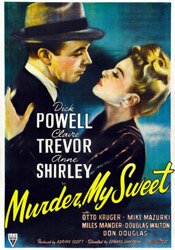 Directed by Edward Dmytryk
Directed by Edward Dmytryk
This murder mystery is, for me, itself a mystery in that I cannot fathom why they would change the title of Raymond Chandler’s book, Farewell, My Lovely to the far less subtle, Murder, My Sweet. I know it had something to do with not wanting to confuse the public with lead actor Dick Powell’s previous roles as a kind of song and dance man, but that doesn’t seem a very credible reason to me.
I suppose it’s not very important in the larger scheme of things, but it makes me shake my head. As for the movie …
When you go over reviews of this movie, as well as other movies based on Chandler’s books, you see one topic continually pop up: who was the best Philip Marlowe? It is probably not surprising to find there is not a great deal of consensus.
It strikes me that Marlowe is a kind of variation on Hamlet in that everyone has to play him, or a variation on him, and we decide who does it well, who doesn’t, and who’s Marlowe we buy into. On the DVD case cover, it tells us Dick Powell, who plays Marlowe in Murder, My Sweet, was author Raymond Chandler’s favourite. Of course, others have different opinions. Bogie comes to mind.
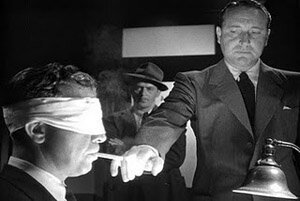 For many people Humphrey Bogart (The Big Sleep) is the Philip Marlowe. But just today I came across a review where the writer was claiming the best Marlowe was Robert Mitchum in 1975’s Farewell, My Lovely.
For many people Humphrey Bogart (The Big Sleep) is the Philip Marlowe. But just today I came across a review where the writer was claiming the best Marlowe was Robert Mitchum in 1975’s Farewell, My Lovely.
I admit that when I first saw Murder, My Sweet a few years ago Powell bothered me, but that had less to do with his performance than the fact I had Bogie so drilled into my head, from The Big Sleep but also similar characters, like Sam Spade from the The Maltese Falcon.
But I watched Murder, My Sweet again last night and I liked Powell much more. His gestures and speech fit the character nicely and he seems very natural as Marlowe. And the more I think about it, the more I think, “Yes, I like Powell’s Marlowe.” (That’s sort of like saying, “I like Plummer’s Hamlet.”)
As for the movie as a movie … It has a lot of what you would expect from a film of this kind: a lot of uncertainty as characters appear to be good, then bad, then good again, and then bad once more. Marlowe seems to think one thing then it’s shown he was only pretending, although a later scene shows he actually does think and feel that way.
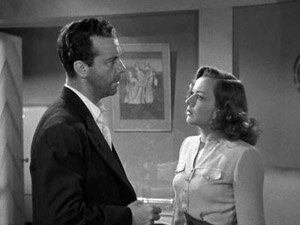 In other words, the movie twists quite a bit and in many cases the twists are arbitrary for the sake of being a twist and to sustain the mood. But they don’t make a lot of sense. Yet in a film noir, you can often get away with that because the movie is less about plot and more about atmosphere, characters, character relationships … and lighting and camera focus.
In other words, the movie twists quite a bit and in many cases the twists are arbitrary for the sake of being a twist and to sustain the mood. But they don’t make a lot of sense. Yet in a film noir, you can often get away with that because the movie is less about plot and more about atmosphere, characters, character relationships … and lighting and camera focus.
I’ve read the book this movie is based on but don’t recall it, so I can only assume the movie stays roughly true to it and, if that’s he case, the filmmakers can thank Chandler for writing them an opening that is a nicely baited hook.
Told almost entirely in flashback by Marlowe, it begins with him in a police station being questioned and telling his story. That wouldn’t be much except we’re shown that he can’t see; his eyes are completely bandaged up. So as he’s is grilled and finally starts telling his story, we’re already hooked on the mystery of what happened to his eyes even before we’ve had an inkling of the real mystery.
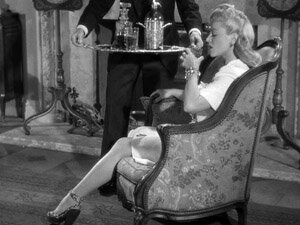 Being film noir, we also get a femme fatale. Claire Trevor is Mrs. Helen Grayle, aka Velma. Director Edward Dmytryk introduces her to us legs first, underlining the character’s sexual nature and involvement with the story. But the there is also Anne Shirley as Ann Grayle, step-daughter and enemy of the second Mrs. Grayle (Velma). It’s easy to see why.
Being film noir, we also get a femme fatale. Claire Trevor is Mrs. Helen Grayle, aka Velma. Director Edward Dmytryk introduces her to us legs first, underlining the character’s sexual nature and involvement with the story. But the there is also Anne Shirley as Ann Grayle, step-daughter and enemy of the second Mrs. Grayle (Velma). It’s easy to see why.
Ann Grayle loves her father (Miles Mander), who is much older than his new wife. He also seems frail by comparison to everyone else in the film, even impotent. And he’s married to a woman who doesn’t appear to cover up what she’s interested in:
Helen Grayle: I find men very attractive.
Philip Marlowe: I imagine they meet you halfway.
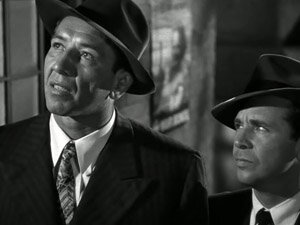 But the movie isn’t just about this. It begins with a man named Moose (Mike Mazurki), who is just out of jail and looking for his Velma.
But the movie isn’t just about this. It begins with a man named Moose (Mike Mazurki), who is just out of jail and looking for his Velma.
Chandler books, and movies of this variety, are peppered with characters, most of whom are types, and give the storyline places to go and people to engage with as well as scenes to play out before getting to an end.
I liked how this one plays out. I like Dick Powell as Philip Marlowe and Claire Trevor as a femme fatale. And I’m pretty sure I’ll be watching this one again.


